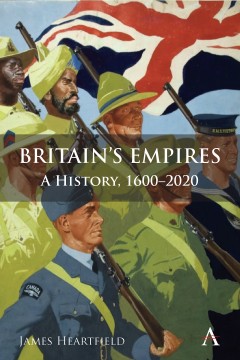Other Formats Available:
- About This Book
- Reviews
- Author Information
- Series
- Table of Contents
- Links
- Podcasts
About This Book
For more than four centuries, Britons have been dominating and colonising other peoples and territories. Britain’s Empires tells that story without flinching from the oppressive and exploitative side of the imperial mission that shaped world history. It also aims to tell the story of the colonial past as one marked by change and reinvention, where each new era was embarked upon as a break with the past.
This is history of the many different British Empires – the Old Colonial System (1600-1776), the Empire of Free Trade (1776-1870), the New Imperialism (1870-1945), Decolonisation (1945-1990) and the era of humanitarian intervention (1990-2020).
As well as explaining the importance of ‘primitive accumulation’ to kickstarting British capitalism in the Old Colonial Era, Heartfield shows that the New Imperialism of the 1880s was in large part a response to economic exhaustion in the mother country, and an attempt to find a new purpose in the colonies. Britain’s Empires also explains the dynamics of decolonisation in the post-war era, the rebalancing of Britain’s relation to the world that allowed it to create an arm’s length relation to newly independent ex-colonies, while carrying on extensive military interventions overseas. The book concludes with an assessment of the post-Cold War resurgence of ‘humanitarian intervention’ in the less developed world, in an important retrospective account.
Britain’s Empires explains how imperial policy dominated andskewed the history of societies across the world, from Canada and the West Indies to Ireland, from Africa to the Middle East, from India to China and into Australasia; but also how the peoples of those territories imposed themselves on Britain, challenging slavery, standing up to colonial overlords and eventually overthrowing them.The book explains how the reinvention of Britain’s Empire reworked its critics protest to reinvent colonisation as a struggle against slavery in the mid-nineteenth century, and a civilising mission at that century’s end. The capacity of Empire to foster local native allies helped stabilise a polity of extraordinary reach. But as Heartfield explains, the subordination of a quarter of the world’s landmass was often a defensive reaction to internal limitations and other imperial challenges. The history of Britain’s Empires, explains Heartfield, is one of constant challenge and change, where vanquished become victors, and heroes often turn out to be villains.
Reviews
This well-researched, profusely illustrated, and welcomed volume can serve in an undergraduate course — CHOICE
"There are few single volume histories of the British Empire that match this book’s temporal and geographical span. Well illustrated and balanced across political, economic and cultural approaches, it serves as an excellent overview of a vast, dynamic and enduring phenomenon that reconfigured Britain and the world" — Professor Alan Lester, FRHistS, School of Global Studies, University of Sussex, UK.
"Heartfield goes beyond the teleological, moralistic and one-size-fits-all approach to the understanding of history that has become so common in contemporary debates about the past. This book takes history and human agency seriously, revealing the complexities, contradictions and competing motives of the different periods of Britain’s Empire, thus bringing forth new insights. This makes for a knowledge-rich, refreshing and challenging read" — Inaya Folarin Iman.
"James Heartfield is without a doubt one of Britain's most original and insightful living historians. His skill in tracing the roots of Britain's imperial history and relating it to wider debates in social science is wonderfully displayed in this book. Read it and be prepared to have your thinking challenged" — Philip Cunliffe, Associate Professor in International Relations, University College London.
"This excellent text offers a deft periodisation; vivid illustrations of key processes and moments of the different times and places of British empire and its discontents; illuminating interconnections between change in Britain and global change; a rich use of contemporary sources; and the author’s nuanced judgements “ —Henry Bernstein, Professor Emeritus of Development Studies, SOAS, University of London.
“Heartfield goes beyond the teleological, moralistic and one-size-fits-all approach to the understanding of history that has become so common in contemporary debates about the past. This book takes history and human agency seriously, revealing the complexities, contradictions and competing motives of the different periods of Britain’s Empire, thus bringing forth new insights. This makes for a knowledge-rich, refreshing and challenging read”— Inaya Folarin Iman, The Equiano Project.
"In this wide-ranging and fascinating book, James Heartfield takes a critical approach to the past, observing the many changes and continuities in Britain’s imperial relationships and shedding light on the various economic, political, and ideological factors that drove those changes. Anyone seeking to understand the (uneven) development of British colonialism over the course of more than four centuries, should read this book”— Dr Cheryl Hudson, Lecturer in U.S. Political History, University of Liverpool.
A strength of the book is how it carefully works to avoid the myths of origins, continuity and teleology. Heartfield enables us to move from a notion of a transhistoric British imperialism to the concrete analysis of concrete situations in which Britain’s Empires operated. —Café Américain
Author Information
James Heartfield wrote The British and Foreign Anti-Slavery Society, Who’s Afraid of the Easter Rising? The Equal Opportunities Revolution and many other books; he is a long-standing campaigner for social justice.
Series
Anthem Studies in British History
Table of Contents
Introduction; PART ONE THE OLD COLONIAL SYSTEM, 1600–1760; PART TWO EMPIRE OF FREE TRADE, 1760–1870; PART THREE MODERN IMPERIALISM, 1870–1947; PART FOUR COMMONWEALTH, 1947–89; PART FIVE EMPIRE OF HUMAN RIGHTS? 1990–2020; Notes; Index
Links
Stay Updated
Information
Latest Tweets



